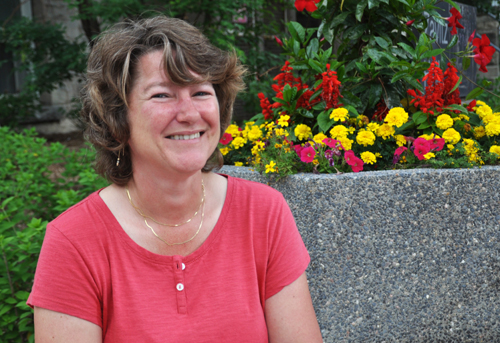
What if you were a patient in a hospital or a long-term care facility, and you were unable to speak for yourself or tell your caregivers how you wanted to be treated? Shannon Buckley, a PhD student in philosophy, is looking at how to improve the dignity of patients who are unable to communicate their needs in a health-care setting.
“I’m interested in how we respect and help those who are not autonomous, who can’t really make decisions for themselves,” she says.
Her research is focused on protecting the dignity of people in advanced stages of dementia, or who have cognitive impairments or brain damage resulting from accidents, disease or stroke. She says these patients are often overlooked by the health-care system because they are unable to make choices in their best interest due to their medical condition.
“There’s a clear tie between autonomy and dignity,” says Buckley, “but I don’t think dignity and inherent value need to rely on the capacity for rationality or autonomy.” Respecting patients’ privacy, giving them some control over their treatment options and respecting their decisions can enhance their sense of autonomy and self-worth, she adds.
Even if someone isn’t conscious of their own dignity, their actions can undermine their dignity in the eyes of those who witness it, including other patients and staff. Patients living in a group home, for example, may be accustomed to being partially clothed, she says, but it’s the responsibility of staff to ensure that patient dignity is respected.
“When the staff see too much of that, they risk seeing that person as someone less than human – and that is a big concern,” says Buckley. “For the person who isn’t capable or mentally competent to be aware of their sense of dignity, they rely on other people to be aware and to protect them from the dehumanizing gaze.”
People can lose their dignity even if there’s no one around to witness it. “As a mentally competent person, you’re a witness to your own dignity,” she says, but a person’s dignity is also relational in that it can be enhanced or destroyed by another person. Ideally, feeling a sense of dignity about ourselves makes us want to respect the dignity of others.
Buckley says everyone has “this inherent worth by virtue of being human.”
That sense of worth begins at birth, starting with the relationships we had with our parents and caregivers, she explains. Those who cared for us as babies and children protected our dignity by ensuring that we were dressed properly and behaved appropriately. That need to have their dignity protected continues into adulthood for people with cognitive disabilities, she says.
As a part-time philosophy student at McMaster University, Buckley also worked in a medical library, where she became interested in bio-ethics and patient autonomy in health-care settings. “The more I read about it, the more confusing it seems to be.”
She says medical ethics tends to focus on the role of medical professionals instead of what’s best for the patient. “I’m not always so sure that it’s trying to look through the patient’s eyes and understand what is good for the patient.”
Putting yourself in the patient’s shoes isn’t necessarily the best approach, she adds, because everyone has their own preference for how they would want to be treated in a health-care setting. What’s good for one patient may not be good for another. A patient’s cultural background, for example, may influence how he or she wants to be treated.
Making hospital gowns less revealing would also help improve patients’ dignity, Buckley jokes.